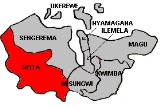
Geita
Encyclopedia
Geita is a town in Tanzania
of approximately 40,000 people, located 90 kilometers west of Mwanza
. Geita first came into prominence as the site of a German colonial gold mine. A German gold prospector discovered the mineral in the early 1900s in the hills surrounding modern-day Geita town. This and other discoveries triggered a gold rush in the surrounding area, attracting German and native prospectors alike. The colonial government established a mine to exploit 'Bismarck Reef'. Mining activities significantly declined, however, when Germany ceded control of its colonies to the British after their defeat in World War I.
Geita regained prominence in the mid to late 1990s when the Tanzanian government opened the mineral sector to foreign investment. A number of medium to large-scale mining
houses, including Ashanti and Anglo-American, conducted extensive exploration activities in the surrounding areas. The most significant outcome of those activities was the construction of the Geita Gold Mine, now owned by AngloGold Ashanti
. The Geita Gold Mine
is Tanzania's largest gold producer.
Gold rushes continue to occur in areas surrounding Geita, mainly in and around Rwamagasa and Matabe. These gold rush
es have attracted tens of thousands of prospectors from all around the country. Being subsistence miners, their activities are highly unregulated, resulting in dangerous mining practices and considerable environmental destruction, not the least of which are increased mercury pollution and extensive deforestation.
 Geita became a region, and the regional seat of the new Geita Region, on January 1, 2011.
Geita became a region, and the regional seat of the new Geita Region, on January 1, 2011.
Tanzania
The United Republic of Tanzania is a country in East Africa bordered by Kenya and Uganda to the north, Rwanda, Burundi, and the Democratic Republic of the Congo to the west, and Zambia, Malawi, and Mozambique to the south. The country's eastern borders lie on the Indian Ocean.Tanzania is a state...
of approximately 40,000 people, located 90 kilometers west of Mwanza
Mwanza
Mwanza is a mid-sized port city on the southern shores of Lake Victoria in northwestern Tanzania. With an urban population of 1.2 million and a metropolitan population of 2 million, it is Tanzania's second largest city, following Dar es Salaam and ahead of other major Tanzanian cities of Arusha,...
. Geita first came into prominence as the site of a German colonial gold mine. A German gold prospector discovered the mineral in the early 1900s in the hills surrounding modern-day Geita town. This and other discoveries triggered a gold rush in the surrounding area, attracting German and native prospectors alike. The colonial government established a mine to exploit 'Bismarck Reef'. Mining activities significantly declined, however, when Germany ceded control of its colonies to the British after their defeat in World War I.
Geita regained prominence in the mid to late 1990s when the Tanzanian government opened the mineral sector to foreign investment. A number of medium to large-scale mining
Mining
Mining is the extraction of valuable minerals or other geological materials from the earth, from an ore body, vein or seam. The term also includes the removal of soil. Materials recovered by mining include base metals, precious metals, iron, uranium, coal, diamonds, limestone, oil shale, rock...
houses, including Ashanti and Anglo-American, conducted extensive exploration activities in the surrounding areas. The most significant outcome of those activities was the construction of the Geita Gold Mine, now owned by AngloGold Ashanti
AngloGold Ashanti
AngloGold Ashanti Limited is a global gold mining company. It was formed in 2004 by the merger of AngloGold and the Ashanti Goldfields Corporation.AngloGold Ashanti Limited is now a global gold producer with 21 operations on four continents...
. The Geita Gold Mine
Geita Gold Mine
The Geita Gold Mine is an open pit gold mine located in the Geita District of the Mwanza Region of Tanzania. It is operated by AngloGold Ashanti....
is Tanzania's largest gold producer.
Gold rushes continue to occur in areas surrounding Geita, mainly in and around Rwamagasa and Matabe. These gold rush
Gold rush
A gold rush is a period of feverish migration of workers to an area that has had a dramatic discovery of gold. Major gold rushes took place in the 19th century in Australia, Brazil, Canada, South Africa, and the United States, while smaller gold rushes took place elsewhere.In the 19th and early...
es have attracted tens of thousands of prospectors from all around the country. Being subsistence miners, their activities are highly unregulated, resulting in dangerous mining practices and considerable environmental destruction, not the least of which are increased mercury pollution and extensive deforestation.


